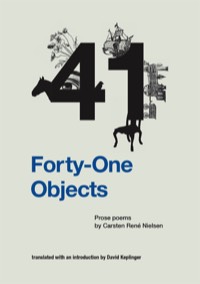
»Forty-One Objects by the Danish poet Carsten René Nielsen, translated by David Keplinger, is one of those books that fills your poetry heart with pure poetry joy. [...] With many poets, good and the other kind, the reader often feels the lines and/or subject is one the reader already knows or expects. Nielsen doesn't row that way. […] Poets like Nielsen give 'Today's book of poetry' optimism, hope. Certain people just know how to burn, they are able to dance from birth.«
—Michael Dennis, Today's book of poetry
FORTY-ONE OBJECTS
The prose poems 'Forty-One Objects' was published 2019 by > The Bitter Oleander Press in the United States. Longlisted for the 2020 National Translation Award in Poetry from the American Literary Translator's Association.
'Forty-One Objects' is translated by American poet David Keplinger and also contains the Danish versions (first published 2017 as 'Enogfyrre ting').
Among the 41 prose poems in 'House Inspections' are these:
> Ruler & Pillow (on the website of the literary journal 'Copper Nickel')
> Ten poems from 'Forty-One Objects' (in the online journal 'Trafika Europe')
»Born in 1966, Nielsen lives in Aarhus, Denmark’s second largest city. It is a bit of a Boston to Copenhagen’s New York. But smaller, more compact. A Jutlandish city, it prides itself on its removal from the urban center. So, while Nielsen’s poems are surrealistic, he has stripped them of ornamentation, ostentation, and over-experimentation. […] In fact, it should be of little surprise to us that Nielsen's strangeness has been embraced—perhaps more than in Denmark—in the United States. His books have found a following here where a cerebral, Pythonesque silliness stands a chance to draw a crowd. Nielsen's archeological excavations, with its grown men in baby carriages, spider theaters, and sneezing trumpets, serve as antidote where politics have sickened us: the delusion of self-importance is momentarily washed away, and a clown sings from inside his barrel, rolling down a dark and lonely street.«
'Forty-One Objects' is translated by American poet David Keplinger and also contains the Danish versions (first published 2017 as 'Enogfyrre ting').
Selected poems
Among the 41 prose poems in 'House Inspections' are these:
> Ruler & Pillow (on the website of the literary journal 'Copper Nickel')
> Ten poems from 'Forty-One Objects' (in the online journal 'Trafika Europe')
From the translator’s introduction
»Born in 1966, Nielsen lives in Aarhus, Denmark’s second largest city. It is a bit of a Boston to Copenhagen’s New York. But smaller, more compact. A Jutlandish city, it prides itself on its removal from the urban center. So, while Nielsen’s poems are surrealistic, he has stripped them of ornamentation, ostentation, and over-experimentation. […] In fact, it should be of little surprise to us that Nielsen's strangeness has been embraced—perhaps more than in Denmark—in the United States. His books have found a following here where a cerebral, Pythonesque silliness stands a chance to draw a crowd. Nielsen's archeological excavations, with its grown men in baby carriages, spider theaters, and sneezing trumpets, serve as antidote where politics have sickened us: the delusion of self-importance is momentarily washed away, and a clown sings from inside his barrel, rolling down a dark and lonely street.«
—David Keplinger
 Carsten René Nielsen
Carsten René Nielsen